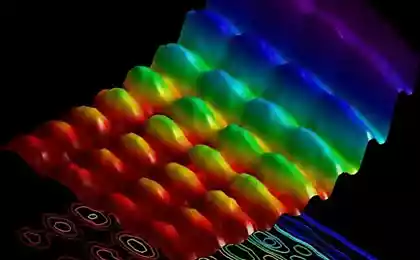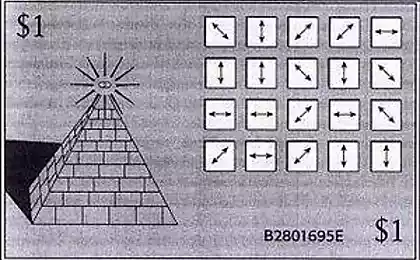505
Quantum technologies will appear on British streets in just two years
Have you heard about quantum mechanics, and now it's time to get acquainted with quantum engineers. After ten years of stay in the laboratory, quantum science is gradually transformed into technology, which will affect your daily life. If these ambitious plans come true, by 2020, the UK may appear the most powerful quantum computer in the world, a secure quantum network for the whole country and the many quantum of the industry.
This mission started in 2013, when the UK Chancellor George Acorn announced an investment of 270 million pounds sterling in quantum technology. Currently, scientists gather in centers focused on specific areas — computing, communications, sensors and renderers, in order to create useful quantum devices in five years, starting in 2015.
Last month teams of scientists held its first annual meeting Quantum IK the University of Oxford to discuss their five-year road map and potential obstacles that must be overcome — not least the well-established view that quantum technology is too strange to be useful.

"When you talk with the General public about quantum physics, the first thing she thinks it's something terrible from the field of philosophy, — said at the meeting, Peter knight from Imperial College in London. This needs to change. Our main message is this: now is a developing technology".Ian Walmsley, head of the center for quantum computation at Oxford, said that fundamental science has advanced far enough to make this dream a reality. "At present the necessary engineering impetus that will lead to the next level".
Unlike a conventional computer that works with binary bits, "qubits" of a quantum computer can be simultaneously 0 and 1. This feature offers opportunities for massive increases in speed when it comes to certain problems like searching databases or machine learning. But if the binary bits based on reliable silicon transistors, a consensus regarding the creation of quantum machines have not yet arrived.
Walmsley and his colleagues are working on a system based on the captured ions, of individual charged atoms that are held in place by electromagnetic fields and irradiated with laser that reads and writes information on them. It is called the Q20:20, because for two years, scientists plan to create a 20-Kurinoe device, beyond the capabilities of modern quantum computers. By the end of the 5-year program engineers hope to link 20 such systems in 400-Kubany processor. "This is enough to perform a number of tasks that today can only supercomputers," says Walmsley.
The network of qubitsThis modular construction uses the achievements of recent progress in the management of the captured ion qubits in the laboratory, which showed that it is possible to successfully manage their fragile quantum state at the smallest scale. Now the Oxford group and others have developed a method to combine these cell qubits in the network of larger processors. This means access once the laboratory experiments in the area of precision quantum equipment.
"What is available in the laboratory already possesses the necessary capacity, says Walmsley. — If we can show that one of these small things work, there will be no obstacles to expand the scale, will only produce more components."Since this computer is designed as a network cell of qubits could potentially be scattered across the country, creating a kind of quantum computer, the cloud, to which you will have access to a lot of people, although the original Q20:20 will probably be tied to one lab, says Walmsley.
However, the British did not have to wait until 2020, because the UK has built a quantum network of a different type, which will be available to the public after a couple of years. Tim spiller, who heads the center for quantum communications at the University of York, builds networks of quantum key distribution (QKD) on fiber optics in Bristol and Cambridge, with the aim of linking two universities across London by the end of the five-year plan.
QKD involves the conversion of photons to specific quantum States to generate and transfer a cryptographically secure key that can be used to encrypt data transmitted over non-quantum channel. Unlike the existing cryptography that relies on a complex mathematical scheme and can be cracked using powerful enough computers, QKD is repelled from the laws of physics: any attempt to intercept the key will raise the alarm.
Such networks already have a place in the United States and China, used by the big business and the government, but the UK network will be available for startups and even for enthusiasts. "The idea is that when everything is ready, you can open it for people, says spiller. In Bristol the emphasis is on consumers who are open to new technologies," he says, whereas in Cambridge, the network will use a small high-tech enterprises.
Current methods of encryption I haven't in danger, but spiller emphasizes that QKD will eventually be able to provide exceptional security. "There are certain types of data, by working with them, people are concerned about the long-term threat of interception or hacking in the future, he says. — If you keep someone's medical records or banking details, you will not want to have them taken away after a certain time".
Quantum keys are disposable in nature, so you need to get them stable delivery. John Rarity from the University of Bristol and his colleagues are working on a device the size of a credit card, which will allow people to receive a batch of keys in networks like ATM and to use them in the future to log into the various services. "Users can access the keystore and share them with a trusted source like a Bank or mobile operator", says Rarity. Don't have to remember passwords or PIN codes — QKD will do everything for you.
In other British centers are developed by quantum devices like the camera is able to see invisible gases, or super-sensitive gravity detectors that can look for underground pipes; perhaps these technologies are poorly distributed to the people, but will find wide application in other areas. The goal is to make the UK a leader in the field of quantum technologies.
Other countries are also investing in quantum engineering. It is not unique to the UK, says Ronald Hanson from the technical University of Delft in the Netherlands. In July, the Dutch government has promised to allocate 135 million euros for the development of quantum technologies for 10 years, and last month, Intel announced a 50-million collaboration with Delft to study how quantum processors can be part of the next generation of high-tech and traditional computers.
"The transition of quantum technologies from the lab to the market amazing to watch, considering what we thought about their applications from the 1980-ies, — said Rarity. And only now it really starts to pay off". published by P. S. And remember, only by changing their consumption — together we change the world! © Join us at Facebook , Vkontakte, Odnoklassniki
Source: hi-news.ru
This mission started in 2013, when the UK Chancellor George Acorn announced an investment of 270 million pounds sterling in quantum technology. Currently, scientists gather in centers focused on specific areas — computing, communications, sensors and renderers, in order to create useful quantum devices in five years, starting in 2015.
Last month teams of scientists held its first annual meeting Quantum IK the University of Oxford to discuss their five-year road map and potential obstacles that must be overcome — not least the well-established view that quantum technology is too strange to be useful.

"When you talk with the General public about quantum physics, the first thing she thinks it's something terrible from the field of philosophy, — said at the meeting, Peter knight from Imperial College in London. This needs to change. Our main message is this: now is a developing technology".Ian Walmsley, head of the center for quantum computation at Oxford, said that fundamental science has advanced far enough to make this dream a reality. "At present the necessary engineering impetus that will lead to the next level".
Unlike a conventional computer that works with binary bits, "qubits" of a quantum computer can be simultaneously 0 and 1. This feature offers opportunities for massive increases in speed when it comes to certain problems like searching databases or machine learning. But if the binary bits based on reliable silicon transistors, a consensus regarding the creation of quantum machines have not yet arrived.
Walmsley and his colleagues are working on a system based on the captured ions, of individual charged atoms that are held in place by electromagnetic fields and irradiated with laser that reads and writes information on them. It is called the Q20:20, because for two years, scientists plan to create a 20-Kurinoe device, beyond the capabilities of modern quantum computers. By the end of the 5-year program engineers hope to link 20 such systems in 400-Kubany processor. "This is enough to perform a number of tasks that today can only supercomputers," says Walmsley.
The network of qubitsThis modular construction uses the achievements of recent progress in the management of the captured ion qubits in the laboratory, which showed that it is possible to successfully manage their fragile quantum state at the smallest scale. Now the Oxford group and others have developed a method to combine these cell qubits in the network of larger processors. This means access once the laboratory experiments in the area of precision quantum equipment.
"What is available in the laboratory already possesses the necessary capacity, says Walmsley. — If we can show that one of these small things work, there will be no obstacles to expand the scale, will only produce more components."Since this computer is designed as a network cell of qubits could potentially be scattered across the country, creating a kind of quantum computer, the cloud, to which you will have access to a lot of people, although the original Q20:20 will probably be tied to one lab, says Walmsley.
However, the British did not have to wait until 2020, because the UK has built a quantum network of a different type, which will be available to the public after a couple of years. Tim spiller, who heads the center for quantum communications at the University of York, builds networks of quantum key distribution (QKD) on fiber optics in Bristol and Cambridge, with the aim of linking two universities across London by the end of the five-year plan.
QKD involves the conversion of photons to specific quantum States to generate and transfer a cryptographically secure key that can be used to encrypt data transmitted over non-quantum channel. Unlike the existing cryptography that relies on a complex mathematical scheme and can be cracked using powerful enough computers, QKD is repelled from the laws of physics: any attempt to intercept the key will raise the alarm.
Such networks already have a place in the United States and China, used by the big business and the government, but the UK network will be available for startups and even for enthusiasts. "The idea is that when everything is ready, you can open it for people, says spiller. In Bristol the emphasis is on consumers who are open to new technologies," he says, whereas in Cambridge, the network will use a small high-tech enterprises.
Current methods of encryption I haven't in danger, but spiller emphasizes that QKD will eventually be able to provide exceptional security. "There are certain types of data, by working with them, people are concerned about the long-term threat of interception or hacking in the future, he says. — If you keep someone's medical records or banking details, you will not want to have them taken away after a certain time".
Quantum keys are disposable in nature, so you need to get them stable delivery. John Rarity from the University of Bristol and his colleagues are working on a device the size of a credit card, which will allow people to receive a batch of keys in networks like ATM and to use them in the future to log into the various services. "Users can access the keystore and share them with a trusted source like a Bank or mobile operator", says Rarity. Don't have to remember passwords or PIN codes — QKD will do everything for you.
In other British centers are developed by quantum devices like the camera is able to see invisible gases, or super-sensitive gravity detectors that can look for underground pipes; perhaps these technologies are poorly distributed to the people, but will find wide application in other areas. The goal is to make the UK a leader in the field of quantum technologies.
Other countries are also investing in quantum engineering. It is not unique to the UK, says Ronald Hanson from the technical University of Delft in the Netherlands. In July, the Dutch government has promised to allocate 135 million euros for the development of quantum technologies for 10 years, and last month, Intel announced a 50-million collaboration with Delft to study how quantum processors can be part of the next generation of high-tech and traditional computers.
"The transition of quantum technologies from the lab to the market amazing to watch, considering what we thought about their applications from the 1980-ies, — said Rarity. And only now it really starts to pay off". published by P. S. And remember, only by changing their consumption — together we change the world! © Join us at Facebook , Vkontakte, Odnoklassniki
Source: hi-news.ru























